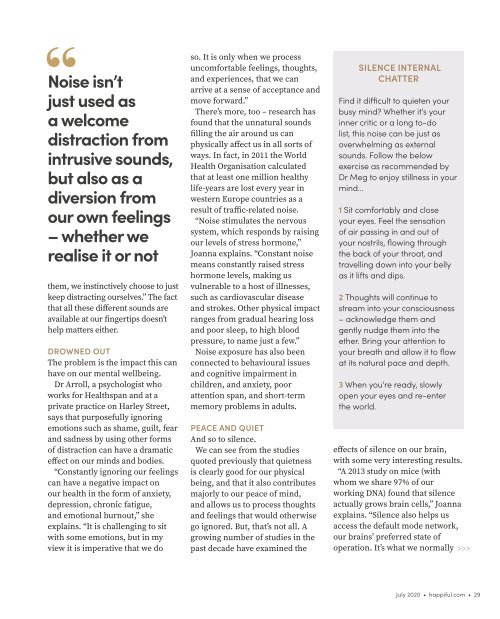Create successful ePaper yourself
Turn your PDF publications into a flip-book with our unique Google optimized e-Paper software.
Noise isn’t<br />
just used as<br />
a welcome<br />
distraction from<br />
intrusive sounds,<br />
but also as a<br />
diversion from<br />
our own feelings<br />
– whether we<br />
realise it or not<br />
them, we instinctively choose to just<br />
keep distracting ourselves.” The fact<br />
that all these different sounds are<br />
available at our fingertips doesn’t<br />
help matters either.<br />
DROWNED OUT<br />
The problem is the impact this can<br />
have on our mental wellbeing.<br />
Dr Arroll, a psychologist who<br />
works for Healthspan and at a<br />
private practice on Harley Street,<br />
says that purposefully ignoring<br />
emotions such as shame, guilt, fear<br />
and sadness by using other forms<br />
of distraction can have a dramatic<br />
effect on our minds and bodies.<br />
“Constantly ignoring our feelings<br />
can have a negative impact on<br />
our health in the form of anxiety,<br />
depression, chronic fatigue,<br />
and emotional burnout,” she<br />
explains. “It is challenging to sit<br />
with some emotions, but in my<br />
view it is imperative that we do<br />
so. It is only when we process<br />
uncomfortable feelings, thoughts,<br />
and experiences, that we can<br />
arrive at a sense of acceptance and<br />
move forward.”<br />
There’s more, too – research has<br />
found that the unnatural sounds<br />
filling the air around us can<br />
physically affect us in all sorts of<br />
ways. In fact, in 2011 the World<br />
Health Organisation calculated<br />
that at least one million healthy<br />
life-years are lost every year in<br />
western Europe countries as a<br />
result of traffic-related noise.<br />
“Noise stimulates the nervous<br />
system, which responds by raising<br />
our levels of stress hormone,”<br />
Joanna explains. “Constant noise<br />
means constantly raised stress<br />
hormone levels, making us<br />
vulnerable to a host of illnesses,<br />
such as cardiovascular disease<br />
and strokes. Other physical impact<br />
ranges from gradual hearing loss<br />
and poor sleep, to high blood<br />
pressure, to name just a few.”<br />
Noise exposure has also been<br />
connected to behavioural issues<br />
and cognitive impairment in<br />
children, and anxiety, poor<br />
attention span, and short-term<br />
memory problems in adults.<br />
PEACE AND QUIET<br />
And so to silence.<br />
We can see from the studies<br />
quoted previously that quietness<br />
is clearly good for our physical<br />
being, and that it also contributes<br />
majorly to our peace of mind,<br />
and allows us to process thoughts<br />
and feelings that would otherwise<br />
go ignored. But, that’s not all. A<br />
growing number of studies in the<br />
past decade have examined the<br />
SILENCE INTERNAL<br />
CHATTER<br />
Find it difficult to quieten your<br />
busy mind? Whether it’s your<br />
inner critic or a long to-do<br />
list, this noise can be just as<br />
overwhelming as external<br />
sounds. Follow the below<br />
exercise as recommended by<br />
Dr Meg to enjoy stillness in your<br />
mind…<br />
1 Sit comfortably and close<br />
your eyes. Feel the sensation<br />
of air passing in and out of<br />
your nostrils, flowing through<br />
the back of your throat, and<br />
travelling down into your belly<br />
as it lifts and dips.<br />
2 Thoughts will continue to<br />
stream into your consciousness<br />
– acknowledge them and<br />
gently nudge them into the<br />
ether. Bring your attention to<br />
your breath and allow it to flow<br />
at its natural pace and depth.<br />
3 When you’re ready, slowly<br />
open your eyes and re-enter<br />
the world.<br />
effects of silence on our brain,<br />
with some very interesting results.<br />
“A 2013 study on mice (with<br />
whom we share 97% of our<br />
working DNA) found that silence<br />
actually grows brain cells,” Joanna<br />
explains. “Silence also helps us<br />
access the default mode network,<br />
our brains’ preferred state of<br />
operation. It’s what we normally >>><br />
<strong>July</strong> <strong>2020</strong> • happiful.com • 29

















